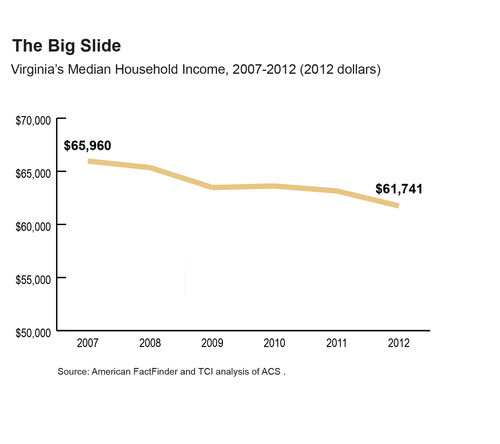September 19, 2013
Virginia’s Fall from Grace
State has Largest Drop in Median Income in the Nation in 2012
Virginia experienced the largest decline in median household income of any state in 2012, according to new data released today by the U.S. Census Bureau, and it’s a trend that will likely continue due to cuts in investments by the federal government.
Virginia’s median household income fell over $1,400 in 2012 – a drop of over 2 percent – landing at $61,741 in 2012, down from $63,147 in 2011.
Only one other state – Missouri – took a significant hit in 2012. While a handful of states had income gains, most of the country stayed flat.
After adjusting for inflation, Virginia’s median household income in 2012 was lower than it was in 2000.

The pain was felt across the commonwealth, too. In the Lynchburg and Roanoke metropolitan areas, household incomes fell by more than $4,300. For Lynchburg households, that was a drop of over 10 percent. No region of Virginia had a significant increase in household income.
So, how did we get here? Well, for starters, Virginia’s economy has benefited for decades from the federal government’s large presence in the state, employing thousands of residents directly and indirectly through contract work. The federal government spends about $17,000 in Virginia for every resident in the state, which is one of the highest per capita levels in the country and almost double the national average. But this reliance on direct federal employment and federal contract work has put the commonwealth at great risk, too.
As the federal government shifted into austerity mode with the Budget Control Act of 2011, cuts to federal spending have caused disproportionate pain for the commonwealth and hurt the well-being of families across the state. And it’s a trend that is likely to continue as the effects of across-the-board spending cuts that began in early 2013 – often referred to as sequestration – are captured in future income data.
Of the total job losses expected from across-the-board federal spending cuts in 2013, nearly 10 percent will come from Virginia – a share second only to California.
It’s easy to be distracted by Virginia’s consistent ranking as one of the wealthiest states in the nation and by reports of rising home values. But this latest Census data is a sobering reminder that working families in our state face real challenges. And as we recalibrate our economy to prepare for a leaner federal government, the state must be committed not only to growing jobs, but growing prosperity, too.
–Sara Okos, Policy Director
